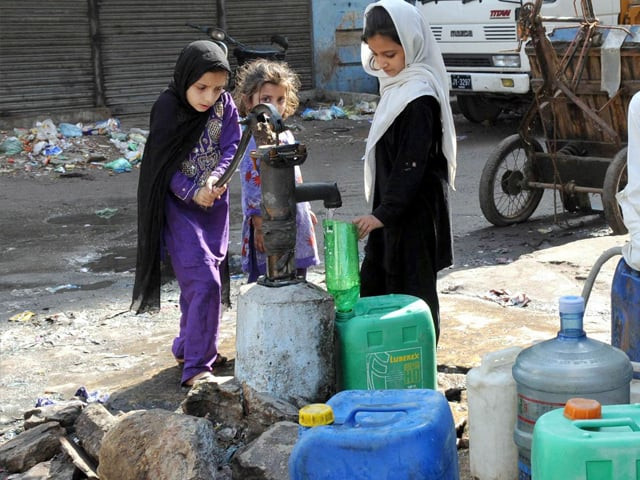Water crises: SC directs govt officials to resolve water scarcity in Karachi
Apex court bench passed directives after hearing applications regarding artificial shortage

Apex court bench passed directives after hearing applications regarding artificial shortage. PHOTO: RASHID AJMERI/EXPRESS
A three-judge bench, headed by Justice Amir Hani Muslim, also asked him to inform the court about the status of provision of funds by the federal government to the province for the K-IV water project. Fixing the hearing after two weeks, the court also directed the Karachi Water and Sewerage Board's (KWSB) managing director to bring reports on measures taken to resolve the water crisis and the alleged lack of transparency in the auction of water hydrants.
The bench passed these directives while hearing applications relating to the artificial shortage of water in the city in connivance with the water utility officials to benefit private operators of tankers and hydrants.
At the outset, the bench expressed its extreme displeasure over absence of the KWSB MD, who had purportedly gone to China. Justice Muslim questioned the deputy managing director the purpose of the water board if the citizens were forced to buy the essential commodity through tankers.
The judges then asked him about the shortage of water in the city. The officer informed that there were 20 pumping stations in Karachi and 550 million gallons water was pumped from the station at Dhabeji. There are 3,500 water supply connections in the city, as compared to over 1.3 million connections of electricity, he added.
The officer mentioned that there was a shortage of water in Korangi and Defence, and maintained that the shortage was caused by lack of water in Hub Dam and other sources.
Justice Muslim observed that there was no mechanism of water distribution, adding that the commodity was supplied to the consumers only after they staged protests. To the judges question about the rates of the water tankers, the KWSB officer said different rates - Rs1,300, Rs1,000, Rs1,700 and Rs2,800 - are charged from the consumers for a fill of water tanker.

Former legislator, who had joined proceedings in public interest, Abdul Hafeez claimed that water meters were imported back in 2008, but they have yet to be installed. An engineer informed the bench that some meters were imported of which 22 bulk meters had already been installed. Hafeez further claimed that Rs440 million were spent to procure the water meters that are lying useless.
After the break, Justice Muslim asked Sindh chief secretary Siddique Memon to look at the competence level of the local government secretary and remarked why the LG department shouldn't also be outsourced if the secretary cannot run it efficiently. "This is unfortunate," Memon replied.
Turning to the chief secretary, the judges asked how long it will take to overcome the water shortage. Memon said 11,500 million gallons is being received for Karachi at the moment, adding that there was still a shortage of 11,000 million gallons. The shortage is being overcome by supplying water through tankers, he added.
The apex court asked the top bureaucrat to make suggestions as to what improvement could be made to meet shortage of water in city. Otherwise, it warned to form committees, comprising district and sessions judges and local legislators, to handle the water distribution matters.
Granting two weeks, the bench directed the KWSB MD to personally appear in court with a concise report as to why a pick-and-choose formula was adopted while auctioning legal hydrants run by the board.
Published in The Express Tribune, August 4th, 2016.



















COMMENTS
Comments are moderated and generally will be posted if they are on-topic and not abusive.
For more information, please see our Comments FAQ